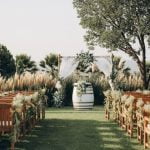Wedding vows are an essential part of the marriage ceremony, symbolizing the promises and commitments made between partners. These vows hold deep significance in expressing love, loyalty, and dedication to one another. In this article, we will delve into the historical origins of wedding vows, explore their traditional and personalized forms, and discuss their role in different cultural and non-religious settings.
As couples stand before their loved ones on their wedding day, exchanging vows becomes a pivotal moment that sets the tone for their journey as a married couple. But what are wedding vows exactly? And why are they so important? These are the questions we aim to answer as we unravel the depth of meaning behind these heartfelt promises.
From traditional wedding vows to personalized expressions of love, we will examine the various forms of wedding vows that couples may choose from today. Additionally, we will delve into the unique cultural practices surrounding wedding vows across different societies around the world. Whether religious or secular, traditional or customized, wedding vows play a crucial role in uniting couples in love and commitment.
History of Wedding Vows
Wedding vows have been a central part of marriage ceremonies for centuries, serving as a solemn promise and commitment between the couple. The history of wedding vows dates back to ancient civilizations, where it was common for couples to make verbal pledges to each other in front of witnesses. These early vows often focused on loyalty, fidelity, and the responsibilities of marriage.
Origins of Wedding Vows
The origins of wedding vows can be traced back to ancient civilizations such as the Egyptians, Greeks, and Romans. In these early societies, wedding vows were considered a sacred promise between the couple and the divine. Vows were meant to solidify the union between husband and wife and were often accompanied by rituals and offerings to seek blessings for the marriage.
Evolution of Wedding Vows
Over time, wedding vows have evolved and adapted to reflect changing societal norms and cultural beliefs. While traditional religious vows have remained prevalent in many cultures, modern couples have also embraced the idea of personalizing their vows to better reflect their relationship and commitments to each other. Additionally, non-religious and alternative wedding vow options have become more common as couples seek ceremonies that align with their personal beliefs.
Wedding Vows Across Different Cultures
The concept of wedding vows is not limited to one specific culture or religion. Throughout history, different cultures around the world have developed their own unique customs and traditions when it comes to exchanging vows during a marriage ceremony. From elaborate Hindu wedding ceremonies in India to simple yet meaningful civil ceremonies in Western countries, each culture brings its own significance and symbolism to the exchange of wedding vows.
Understanding the historical roots and cultural variations of wedding vows provides insight into their importance in modern-day marriage ceremonies. As couples continue to honor this timeless tradition, they are also embracing new ways to personalize their vows while respecting diverse customs from around the world.
Traditional Wedding Vows
Some commonly used traditional wedding vows include:
- “To have and to hold, from this day forward, for better or for worse, for richer or for poorer, in sickness and in health, to love and to cherish, till death do us part.”
- “I, (name), take thee (name), to be my wedded husband/wife, to have and to hold from this day forward, for better, for worse, for richer, for poorer, in sickness and in health.
These traditional vows carry deep meanings that emphasize the couple’s commitment to stand by each other through all circumstances. They express love, loyalty, support, and the promise of a lifelong partnership.
The exchange of traditional wedding vows dates back centuries across various cultures and religions. While the specific wording may vary slightly between denominations or regions, the underlying principles remain consistent. Couples often choose traditional wedding vows because they provide a sense of continuity with past generations and create a connection with their heritage. Whether spoken verbatim or adapted to suit individual preferences, these time-honored vows continue to play a significant role in uniting couples in matrimony.
Personalized Wedding Vows
The trend of couples writing their own personalized wedding vows has become increasingly popular in recent years. This modern approach to exchanging vows allows the couple to express their unique love, promises, and commitment in a way that reflects their individual personalities and relationship. Personalized wedding vows are a beautiful way for couples to make their ceremony more personal and meaningful.
When it comes to creating personalized wedding vows, there are a few important steps to consider. First and foremost, it’s essential for the couple to communicate openly about what they want to express in their vows. They should discuss the tone, length, and overall message they want to convey. It’s important for both partners to be on the same page when it comes to the style and content of their vows.
Next, couples can draw inspiration from various sources such as poetry, literature, or even anecdotes from their own relationship. Reflecting on shared experiences, inside jokes, or meaningful moments can help personalize the vow-writing process and infuse them with genuine emotion. Finally, it’s crucial for both partners to review each other’s vows before the big day to ensure that they align with one another’s beliefs and expectations.
In summary, personalized wedding vows offer a special opportunity for couples to truly express their love and commitment in a way that is authentic and unique to them. By following these steps and putting in thoughtful effort into the vow-writing process, couples can create heartfelt promises that will resonate with them on their special day.
Non-Religious Wedding Vows
Wedding vows are an essential part of a marriage ceremony, symbolizing the promises and commitments made between two individuals. For couples who are not religious or do not want a traditional ceremony, there are alternative wedding vow options that can be tailored to reflect their beliefs and values. Non-religious wedding vows offer the opportunity for couples to express their love and commitment in a way that is meaningful to them, regardless of their religious or spiritual affiliations.
One option for non-religious wedding vows is to focus on the couple’s personal experiences and journey together. These types of vows often include anecdotes, memories, and specific promises that hold sentimental value for the couple. By incorporating personal elements into their vows, couples can create a unique and heartfelt expression of their love and commitment.
Another alternative for non-religious wedding vows is to draw inspiration from literature, poetry, or meaningful quotes. Couples can choose passages from literature that resonate with them or use poetry that holds special significance in their relationship. By selecting readings that reflect their values and emotions, couples can infuse depth and meaning into their wedding vows.
One popular trend among non-religious couples is to include promises related to partnership, equality, and mutual respect in their wedding vows. This approach emphasizes the principles of teamwork and support within the relationship. By prioritizing these ideals in their vows, couples can articulate their dedication to fostering a strong and harmonious partnership based on trust and understanding.
Cultural Wedding Vows
Native American Wedding Vows
In Native American wedding ceremonies, wedding vows often involve the couple making promises to honor and respect each other, as well as to acknowledge their spiritual connection. The exchange of vows may also include references to nature and elements such as earth, water, fire, and air, symbolizing the unity between the couple and the world around them.
Hindu Wedding Vows
Hindu weddings feature intricate and meaningful wedding vows known as the Saptapadi, or seven steps. During this ritual, the couple takes seven steps together, each step representing a specific vow such as nourishing each other, growing together in strength and wisdom, and loyalty towards one another. These vows are deeply rooted in Hindu traditions and hold significant spiritual meaning for the couple.
Japanese Wedding Vows
In Japan’s traditional Shinto weddings, couples partake in a ritual called Sansankudo where they drink sake three times from three different-sized cups. This act symbolizes the union of the couple’s families and expresses their commitment to each other. The exchange of wedding vows in this context emphasizes the importance of family harmony and unity.
From ancient civilizations to modern-day traditions, wedding vow customs vary widely across different cultures. Whether it’s through symbolic rituals or verbal commitments, these unique practices reflect the values and beliefs of each culture when it comes to marriage. Understanding these diverse traditions can inspire couples in creating their own personalized wedding vows that incorporate elements from various cultural backgrounds.
Renewing Wedding Vows
Vow renewal ceremonies have become increasingly popular in recent years, with many couples choosing to reaffirm their commitment to each other in a meaningful way. These ceremonies are often held on milestone anniversaries, such as the 10th, 25th, or 50th year of marriage, but can also be done at any time a couple feels the need to recommit to each other.
The significance of vow renewal ceremonies lies in the opportunity for couples to reflect on their journey together and celebrate their enduring love and partnership.
There are various reasons why couples choose to renew their wedding vows. For some, it may be a way to commemorate a significant anniversary and mark the longevity of their relationship.
For others, it could be a response to overcoming difficult times or challenges together, serving as a symbol of resilience and perseverance. Additionally, some couples may choose to renew their vows as a way of expressing their ongoing love and commitment in front of family and friends who were not present at their original wedding ceremony.
While vow renewals may not hold the same legal weight as a traditional wedding ceremony, they are nonetheless deeply meaningful for many couples. These events provide an opportunity for spouses to express their continued love and dedication to each other in front of those they hold dear. Whether through traditional vows or personalized ones, vow renewal ceremonies serve as a beautiful reminder of the enduring nature of love and marriage.
| Reasons for Renewing Vows | Significance |
|---|---|
| Celebrate milestone anniversaries | Reflect on journey together |
| Mark resilience and perseverance | Express ongoing love and commitment |
| Evoke symbolism | Opportunity for expression in front of loved ones |
Tips for Writing Wedding Vows
In conclusion, wedding vows hold a significant role in a marriage ceremony, as they represent the promises and commitment that couples make to each other. Throughout history and across different cultures, wedding vows have evolved and taken on various forms, reflecting the values and traditions of the time and place. From traditional vows with deep-rooted meanings to personalized vows crafted by the couple themselves, the exchange of vows is a deeply personal and meaningful aspect of a wedding ceremony.
The trend of writing personalized wedding vows has become increasingly popular, allowing couples to express their love, promises, and hopes for the future in their own words. This process not only adds a personalized touch to the ceremony but also provides an opportunity for couples to reflect on their relationship and set intentions for their marriage. Additionally, non-religious couples or those seeking alternative options can explore different types of wedding vow options that align with their beliefs and values.
The act of renewing wedding vows has also become a common practice for many couples, providing an opportunity to reaffirm their love and commitment to one another. Whether it’s celebrating milestone anniversaries or overcoming challenges together, vow renewal ceremonies offer a chance for couples to revisit their promises and celebrate their enduring love.
Ultimately, regardless of the type of wedding vows chosen, the sincerity and authenticity behind the words spoken serve as a testament to the bond shared between two individuals embarking on this lifelong journey together.
Frequently Asked Questions
What Are the 7 Promises of Marriage?
The 7 promises of marriage, also known as the “Saat Pheras,” are part of traditional Hindu marriage ceremonies. These promises include vows to support each other, uphold family values, and maintain a lifelong commitment.
What Are the 3 Promises of Marriage?
In Christian wedding ceremonies, the three promises of marriage typically include vows to love and cherish one another, to be faithful in good times and bad, and to support each other for better or for worse.
What Are the Basic Modern Wedding Vows?
Basic modern wedding vows often include promises to love and support one another, to be faithful and loyal in marriage, and to work together as partners through life’s challenges. These vows may also include personal touches that the couple adds themselves.

Welcome to my blog about home and family. This blog is a place where I will share my thoughts, ideas, and experiences related to these important topics. I am a stay-at-home mom with two young children. I hope you enjoy reading it! and may find some helpful tips and ideas that will make your home and family life even better!





